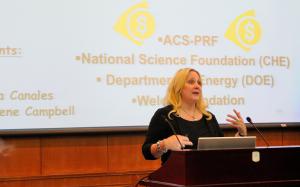Kim Renee Dunbar Receives ACS Award for Distinguished Service in the Advancement of Inorganic Chemistry
Texas A&M University chemistry professor Kim Dunbar has received the ACS Award for Distinguished Service in the Advancement of Inorganic Chemistry. Below, she and her colleagues comment on the announcement and explain the landmark contributions Dunbar has made in the field of chemistry.
Kim Renee Dunbar earned her Ph.D. in inorganic chemistry from Purdue University in 1984 and conducted postdoctoral research at Texas A&M. Nearly fifteen years after graduating, she joined the chemistry faculty at Texas A&M after leaving the chemistry department at Michigan State University.
She’s earned a variety of distinctions and awards in her career thanks to her major contributions to chemistry and scientific knowledge as a whole. In 2004, Kim Renee Dunbar was named a Davidson Professor of Science as well as a joint holder of the Davidson Chair in Science, making her the first female chair holder ever in the College of Science. In 2007, she was named a Distinguished Professor of Chemistry, which remains Texas A&M’s highest academic faculty rank.
In addition, she has been honored with an Alfred P. Sloan Foundation Fellowship in the past, a Camille & Henry Dreyfus Teacher-Scholar Award, and fellowships in both the American Association for the Advancement of Science and the American Institute of Chemists.
Kim Dunbar is also a two-time recipient of the Texas A&M Association of Former Students Distinguished Achievement Award, receiving the inaugural award in 2006 and another in 2012. Also in 2012, Dunbar earned the first Texas A&M Women Former Students’ Network Eminent Scholar Award ever offered.
“She stands as an exemplary role model for young women who aspire to academic positions in chemistry,” says Jeffrey R. Long of the University of California, Berkeley, who is a longtime colleague.
Kim Renee Dunbar has now won an ACS award for her contributions, making her only the second female recipient ever of ACS’s top award for inorganic chemistry.
“I have been passionate about inorganic chemistry since I was an undergraduate, and I could not imagine another career,” says Kim Renee Dunbar. “I deeply admire the previous recipients of the award, all of whom set the bar very high for all of us in inorganic chemistry and inspired me greatly.”
The research she conducts on synthetic and structural inorganic chemistry employs the principles of coordination chemistry to solve a range of diverse problems. From her research, developers around the world have created new magnetic and conducting materials as well as specialized anticancer agents that will be instrumental in saving lives.
Dunbar was presented with the ACS award and gave an official address before the Division of Inorganic Chemistry.
“I am highly honored to receive this award,” she says. “The many excellent students, postdocs, and coworkers who have contributed to the success of my research program share this award with me.”

Dr. Kim Renee Dunbar Earns Honorary Degree from Westminster College
One of the nation’s premier chemists, Dr. Kim Renee Dunbar has been honored with distinguished alumna awards from Westminster College and Purdue University. The Distinguished Professor of Science at Texas A&M University received an honorary degree, doctor of science, honoris causa, during Westminster’s 158th commencement ceremonies.
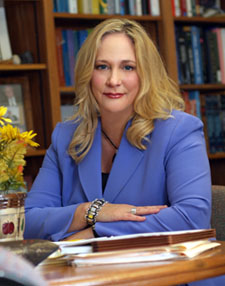
Having dedicated her professional career to the research and education of young chemists, Dr. Kim Renee Dunbar has earned a range of accolades and awards, such as the Camille and Henry Dreyfus Teacher-Scholar Award and the Alfred P. Sloan Foundation fellowship. Her contributions have helped countless scientists around the world understand intricate and complex subjects such as organic and inorganic composite materials, molecular magnetism, and metal-based chemotherapy. Her work on coordination chemistry principles has helped to further research in magnetic materials and new anticancer agents.
Her latest achievement, an honorary degree, doctor of science, honoris causa, recognizes her distinguished contributions to the field of chemistry in laboratories and clinical settings around the world. She was awarded the honorary degree at Westminster College’s 158th commencement ceremonies where hundreds had gathered on the lawn of the New Wilmington campus.
Her landmark work in chemistry has affected science on a global scale, and she earned the titles of Fellow of the Royal Society of Chemistry, Fellow of the American Chemical Society and Fellow of the American Association for the Advancement of Science for the impact her research has had on the scientific community as a whole. For over two decades, Dr. Kim Renee Dunbar has helped lead the Department of Chemistry at Texas A&M University to new heights with her impactful research in the area of synthetic, structural, and physical inorganic and bioinorganic chemistry. Additionally, Dr. Kim Renee Dunbar uncovered critical new evidence behind structure and bonding relationships as well as chemical phenomena.
The commencement ceremony honored her as a living legend in science and university alumni––she was a 1980 Westminster graduate––and invited her to share her thoughts on “Blue Skies: The Value of a Liberal Arts Education.”
“I sincerely believe that my education at Westminster College provided me with the tools that I desperately needed to decide first, what I wanted to think about and, second, what I wanted to do with this information,” Dr. Kim Renee Dunbar told the audience. “My liberal arts education facilitated a desire to experiment: to explore entirely unknown territories without fear and with the confidence that questioning my own knowledge is not only a good idea but is absolutely necessary in order to be a good scientist and mentor.”
Dr. Kim Renee Dunbar earned a Ph.D. in inorganic chemistry from Purdue University and performed post-doctoral research at Texas A&M University before joining the Michigan State University faculty. There, she rose to the rank of University Distinguished Professor before eventually transferring back to Texas A&M in 1999 to become a faculty member in the Department of Chemistry.

3 Notable Awards and Honors Scientist Kim Renee Dunbar Has Received in Her Career
Inorganic Chemist Kim Renee Dunbar’s Impressive Awards of the Last Several Decades
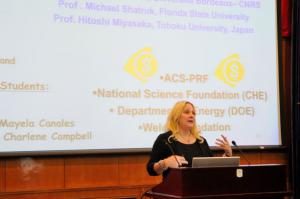 Kim Renee Dunbar is a prolific inorganic chemist who has received countless honors and awards throughout her career. Kim Renee Dunbar currently teaches at Texas A&M University and is a University Distinguished Professor and holds The Davidson Chair of Science in the Chemistry Department.
Kim Renee Dunbar is a prolific inorganic chemist who has received countless honors and awards throughout her career. Kim Renee Dunbar currently teaches at Texas A&M University and is a University Distinguished Professor and holds The Davidson Chair of Science in the Chemistry Department.
In addition to the honors she has received, Kim Renee Dunbar has authored more than 430 publications. Here are some of the awards she has received throughout her career.
-
Fred Basolo Medal For Outstanding Research in Inorganic Chemistry
Kim Renee Dunbar received the prestigious Fred Basolo Medal For Outstanding Research in Inorganic Chemistry, which will be presented at a ceremony on October 2019. The Fred Basolo Medal is named for a professor at Northwestern University, who made the university’s inorganic chemistry department one of the very best in the United States.
“I knew Fred Basolo quite well,” said Kim Renee Dunbar upon learning she would be given this prestigious award. “He took an interest in me when I was a young professor. He and I had many long talks, and he regaled me with stories about the history of coordination chemistry. He was a wonderful role model and an inspiration to me.”
-
The Distinguished Service Award for the Advancement of Inorganic Chemistry
Kim Renee Dunbar received the Distinguished Service Award for the Advancement of Inorganic Chemistry in 2015, when it was presented to her in Boulder, Colorado. She is only the second woman to receive this honor. This award is given for her significant contributions to inorganic chemistry through research and service. It is a huge honor and distinction to be recognized with this award, and it was even more meaningful to be one of only two women to ever receive it, Kim Renee Dunbar said.
She hopes to pave the way for future women in STEM fields to realize their potential and succeed following her inspiring example. Kim Renee Dunbar also encourages young people in the field through her research group, The Dunbar Research Group, at Texas A&M University, which conducts a wide variety of research from molecular magnetism to anti-cancer compounds to multifunctional materials with organic radicals.
-
Honorary Degree From Westminster College
With too many awards to name, another honor granted to Kim Renee Dunbar is an honorary degree that was bestowed upon her in 2012. This honorary doctor of science was given to her in from Westminster College, an outstanding liberal arts college in New Wilmington, Pennsylvania. Kim Renee Dunbar attended Westminster College for her bachelor’s degree in chemistry which she obtained in 1980. Kim Renee Dunbar delivered the commencement address to the May 2012 graduating seniors and their families at a ceremony held on the lawn of the campus in New Wilmington.
“I sincerely believe that my education at Westminster College provided me with the necessary tools that I desperately needed to decide, first, what I wanted to learn, and, second, what I wanted to do with my knowledge,” Kim Renee Dunbar said of the education she received at her alma mater.

5 Publications of Kim Renee Dunbar That Made an Impact in the Scientific Community
These Scientific Publications by Kim Renee Dunbar Represent Forefront Research in the Field of Inorganic Chemistry
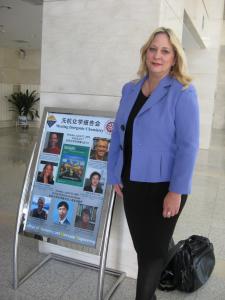 Kim Renee Dunbar, a leader in inorganic chemistry, has received many awards and written hundreds of publications throughout her career. She received her Ph.D. in inorganic at Purdue University and is now a professor at Texas A&M University, holding the Davidson Chair of Science and ia ae Distinguished Professorship of Chemistry there.
Kim Renee Dunbar, a leader in inorganic chemistry, has received many awards and written hundreds of publications throughout her career. She received her Ph.D. in inorganic at Purdue University and is now a professor at Texas A&M University, holding the Davidson Chair of Science and ia ae Distinguished Professorship of Chemistry there.
Kim Renee Dunbar’s research has been focused on a wide range of areas, with extensive research in synthetic, biological and physical inorganic chemistry. Here are just five of the publications of Kim Renee Dunbar that have been influential and made a difference in the inorganic chemistry scientific community.
1. “Novel Binding Interactions of the DNA Fragment d(pGpG) Cross-Linked by the Antitumor Active Compound Tetrakis (m-carboxylato)dirhodium(II, II)”: H. T. Chifotides, K. M. Koshlap, L. M. Prez, K. R. Dunbar, J. Am. Chem. Soc. 2003.
According to the abstract of this publication, “Insight into the N7/O6 equatorial binding interactions of the antitumor active complex… with the nucleotide 5′-GMP and the DNA fragment d(pGpG) has been obtained by one- (1D) and two-dimensional (2D) NMR spectroscopy.”
2. “A Remarkable Family of Rhodium Acetonitrile Compounds Spanning Three Oxidation States and with Nuclearities Ranging from Mononuclear and Dinuclear to One-Dimensional Chains”: M. E. Prater, L. E. Pence, R. Clrac, G. M. Finniss, C. Campana, P. Auban-Senzier, D. Jrome, E. Canadell, K. R. Dunbar, J. Am. Chem. Soc. 1999.
According to the abstract of this publication, “A series of homoleptic cations of Rh(I, II), Rh(II), and Rh(III) have been synthesized and characterized in the solid-state and in solution… The mixed-ligand, square planar cation… was found to form a 1-D stack in the solid-state, unlike previously reported salts with bulky counterions. For all of the compounds under investigation, infrared spectroscopy and X-ray studies were performed. The mixed-valence product was also characterized by EPR spectroscopy and SQUID magnetometry.”
3. Metal-organic frameworks as platforms for isolating individual single-molecule magnets in pores. Joshua B. Pyser, Darpandeep Aulakh, Xuan Zhang, Andrey A. Yakovenko, Kim R. Dunbar and Mario Wriedt, J. Am. Chem. Soc., 2015.
According to the abstract of this publication, “The results provide incontrovertible evidence that the magnetic composite, SMM@MOF, combines key SMM properties with the functional properties of MOFs. Most importantly, the incorporated SMMs exhibit a significantly enhanced thermal stability with SMM loading advantageously occurring at the periphery of the bulk MOF crystals with only a single SMM molecule isolated in the transverse direction of the pores.”
4. Optimizing the Electronic Properties of Photoactive Anticancer Oxypyridine Bridged Dirhodium(II, II) Complexes, Zhanyong Li, Amanda David, Bryan A. Albani, Jean-Philippe Pellois, Claudia Turro, and Kim R. Dunbar, J. Am. Chem. Soc., 2014.
According to the abstract of this publication, “These results clearly demonstrate the importance of tuning the ligand field around the dimetal center to maximize the photoreactivity and achieve the best photodynamic action.”
5. Cyanide Single-Molecule Magnets Exhibiting Reversible, Solvent Dependent “On” and “Off” Exchange Bias Behavior. Dawid Pinkowicz, Heather I. Southerland, Carolina Avendaño, Andrey Prosvirin, Wolfgang Wernsdorfer, Kasper S. Pedersen, Jan Dreiser, Rodolphe Clérac and Kim R. Dunbar, J. Am. Chem. Soc., 2015.
According to the abstract of this publication, “It was found that all compounds exhibit switchable single-molecule magnet (SMM) and exchange-bias behavior depending on the interstitial methanol content.”

What is the Dunbar Research Group? Founder Kim Renee Dunbar Explains the Group’s Philosophy
Kim Renee Dunbar Discusses Her Inorganic Chemistry Research Group at Texas A&M University
Kim Renee Dunbar, an acclaimed scientist in the field of inorganic chemistry, founded the Dunbar Research Group in Lansing, Michigan at Michigan State University in 1987 and later moved her research enterprise to College Station at Texas A&M University in 1999 where she is a Distinguished Professor. Kim Renee Dunbar said this group is one of the projects of which she is most proud, as she has the chance to inspire many young students to pursue chemistry and to be curious about the subjects in science that interest them.
“The Dunbar research group focuses on coordination chemistry, but we also have researched many other topics of inorganic chemistry,” Kim Renee Dunbar said. Indeed, everything from anti-cancer compounds to molecular magnetism are researched by the group. A lot of the topics researched are based on what members of the group are interested in, Kim Renee Dunbar said.
Kim Renee Dunbar was named a Davidson Professor of Science at Texas A&M University in 2004 and is now holder of the Davidson Chair in Science. She was the first female to be given an endowed Chair in the history of the Texas A&M College of Science. She received a Graduate Mentoring Award from the university in 2006.
According to the Dunbar Research Group webpage, “research in the Dunbar Research Group spans a number of topics in synthetic and structural inorganic chemistry with a focus on problems at the interface of materials and biological chemistry.” Physical techniques like Electronic, EPR, infrared spectroscopies, X-ray crystallography, AC and DC magnetic magnetometry, and electrochemistry are mastered by her group members.
“The Dunbar Research Group students, postdoctoral researchers and Visiting Scholars are committed to investigating a breadth of problems,” said Kim Renee Dunbar.
The group is highly international, with a strong commitment to collaboration, which makes them a pleasure to work with, Kim Renee Dunbar said. It is made up of a Visiting scholar, two postdoctoral Research Associates, nine Ph.D. students and two undergraduate students. Members of the group must perform their own measurements and interpret their data. Written and oral communication skills are emphasized by presenting at weekly group meetings and providing written reports.
I focus not only on research in mentoring my group, I also emphasize skills that will benefit them in any future career, especially public speaking and writing, so I make it a priority for them to acquire strong skills in a wide variety of areas ,” Kim Renee Dunbar said. The students also work on writing their own publications and attend conferences to present their findings, allowing them to network with others and gain real-world experience.
Another key component of the Dunbar Research Group is collaborating with national and international scientists. This “allows for the group to expand the level of our understanding in specialized areas,” according to the Dunbar Research Group website.
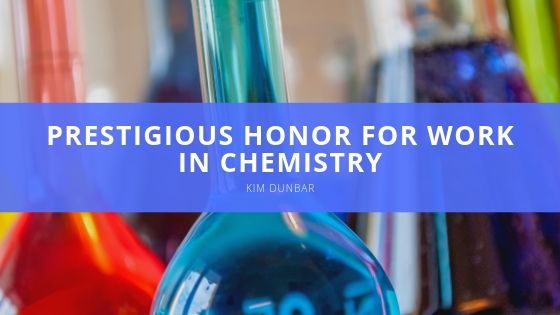
What is an Honorary Degree? Kim Dunbar Receives Prestigious Honor for Work in Chemistry
Kim Dunbar Recognized for Work in Science Over the Decades
 What is an honorary degree, and how can you earn one? According to Priceonomics (https://priceonomics.com/why-do-colleges-give-out-honorary-degrees/), honorary degrees have been awarded for more than 500 years. They are given to an individual for whom the usual requirements of attaining a degree are waived.
What is an honorary degree, and how can you earn one? According to Priceonomics (https://priceonomics.com/why-do-colleges-give-out-honorary-degrees/), honorary degrees have been awarded for more than 500 years. They are given to an individual for whom the usual requirements of attaining a degree are waived.
Kim Dunbar, a 1980 Westminster graduate, was given an honorary doctor of science degree in 2012 by Westminster College. Kim Dunbar is now the holder of the Davidson Chair of Science at Texas A&M University. She received her bachelor’s degree in chemistry at Westminster College in 1980, and then went on to earn her Ph.D. at Purdue University.
“I received my Ph.D. in inorganic chemistry from Purdue University,” said Kim Dunbar. “However, years later, Westminster College, my alma mater, honored me with an honorary doctor of science degree. It was a gesture that deeply touched me.”
How did Kim Dunbar join people like Oprah and Ruth Bader Ginsburg in receiving an honorary degree? She is renowned for her research in the fields of physical and inorganic chemistry. Kim Dunbar has made breakthroughs in several areas of study, including molecular magnetism and metal-based chemotherapy.
“I sincerely believe that my education at Westminster College provided me with the tools that I desperately needed to decide, first, what I wanted to think about and second, what I wanted to do with this information,” Kim Dunbar said when she received her honorary degree. “My liberal arts education facilitated a desire to experiment: to explore entirely unknown territories without fear and with the confidence that questioning my own knowledge is not only a good idea but is absolutely necessary in order to be a good scientist and mentor.”
Westminster College, located in New Wilmington, Pennsylvania, is located an hour north of Pittsburgh in the heart of Amish country. It was founded in 1852 with an affiliation with the Presbyterian Church. According to its website, Westminster is “proud of its heritage, and optimistic about its future. Serving the needs of students has enabled Westminster to become one of the nation’s finest liberal arts colleges.”
In addition to her study and breakthroughs, Kim Dunbar has authored more than 400 publications, including scientific articles, papers, reviews and book chapters. She served as the Associate editor of Inorganic Chemistry for many years.
This honorary degree was not the first time Kim Dunbar has been recognized for her achievements, however. She has been given distinguished alumna awards from Westminster College and Purdue University. She has also received an Alfred P. Sloan Foundation Fellowship, a Camille and Henry Dreyfus Teacher-Scholar award and numerous fellowships as well as a national American Chemical Society Award in 2015 and a Medal from the Chicago section of the American Chemical Society in 2019. She is a Fellow of the American Association for the Advancement of Science, the American Chemical Society and the Royal Society of Chemistry.
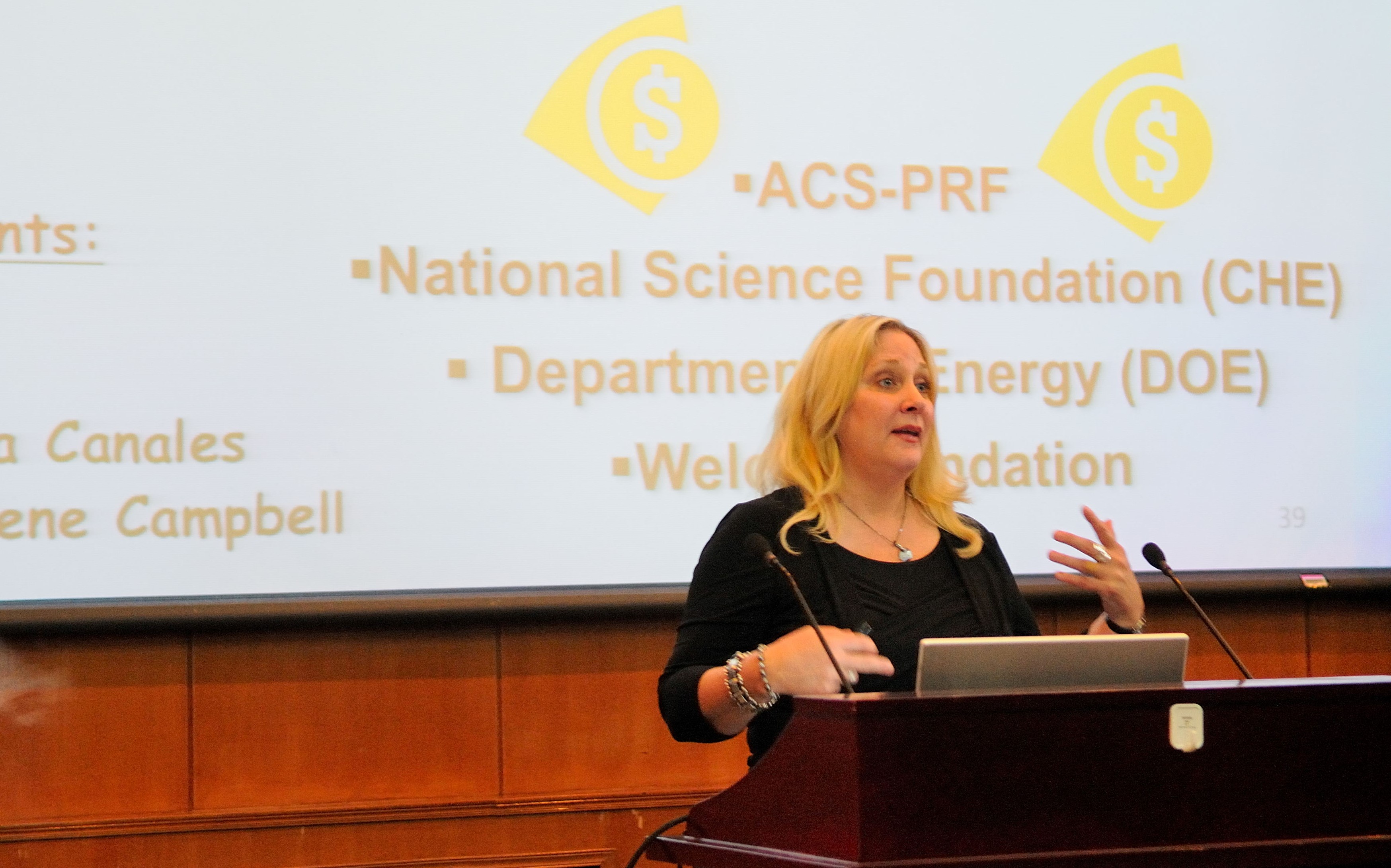
Dunbar Research Group Conducts Valuable Chemistry Research, Founded by Kim Dunbar
Kim Dunbar on Her Research Group, Which Emphasizes Coordination Chemistry
The Dunbar Research Group is based in College Station, Texas, at Texas A&M University. The director of the research group is Kim Dunbar, an accomplished chemist who has received many awards. The Dunbar group conducts research in the area of inorganic chemistry, with an emphasis on coordination chemistry.
“We strive to elucidate the relationship between molecular structure and physical properties in each specific application of our research,” Kim Dunbar said.
The research the Dunbar group conducts is varied, ranging from topics of molecular magnetism, anti-cancer compounds and multifunctional materials with organic radicals. “The variety of goals for our research provides the students in my group with the opportunity to expand their chemical knowledge outside the boundaries of their specialty,” said Kim Dunbar.
Students in the Dunbar group gain experience in a wide variety of techniques and instrumentation, including air-free synthesis, X-ray crystallography, SQUID magnetometry, mass spectrometry, computational chemistry, cell viability assays, electrochemistry and electronic, EPR, infrared and NMR spectroscopies.
Currently, the group has a visiting scholar, two postdoctoral research associates, nine Ph.D. students and two undergraduate students. Professors and scholars have been part of the Dunbar Research Group since 1994. The group participates in numerous outreach events, including a chemistry open house and a science Olympiad, which gives students an opportunity to share their work with others at the university, according to Kim Dunbar.
The research of the Dunbar Research Group has been funded over the years by the National Institutes of Health, Department of Energy, the National Science Foundation, the American Chemical Society Minority Scholars Program, and the Welch Foundation, among others. To find out more about the research the group is doing, visit http:/dunbar.tamu.edu.
Kim Dunbar, the founder of the research group, received a Ph.D. in inorganic chemistry at Purdue University. She is a University Distinguished Professor and holds the Davidson Chair of Science in the chemistry department at Texas A&M University. Kim Dunbar has been given numerous awards for her teaching and research over the years. Some of these include an Alfred P. Sloan Fellowship, Sigma Xi Research Award, Distinguished Alumni Award from Westminster College, Purdue University Distinguished Alumna Award , the 2015 Americn Chemical Society Award for Distinguished Service in the Advancement of Inorganic Chemistry sponsored by Strem Chemicals, and the 2019 Basolo Medal for Outstanding Research in Inorganic Chemistry. The Basolo Award, presented annually by Northwestern University, is co-sponsored by the American Chemical Society Chicago Section and named for the late Northwestern chemist Fred Basolo, who was the Charles E. and Emma H. Morrison Emeritus Professor of Chemistry and served as president of the ACS in 1983 Kim Dunbar has also been featured alongside other prominent women in science, including Marie Curie, in Angewandte Chemie on Women in Chemistry (2011). At Texas A&M University she is the first woman in the College of Science to be named a Chaired Professor.
Kim Dunbar’s research in synthetic and structural inorganic chemistry is focused on the use of coordination chemistry to establish structure/bonding/property relationships in molecular materials and in metal-based drugs. She is the author of over 420 publications. Her experimental and theoretical work to understand physical and chemical phenomena have redirected and focused the work of other researchers in her field.

5 Facts About 2019 Basola Medal for Outstanding Research in Inorganic Chemistry Recipient Kim Renee Dunbar
Get to Know Kim Renee Dunbar, Who Has Gained Honor For Her Years of Service in the Field of Inorganic Chemistry
 Kim Renee Dunbar, who was chosen as the winner of the prestigious 2019 Basola Medal for Outstanding Research in Inorganic Chemistry, has received dozens of awards and honors over her 30-year career.
Kim Renee Dunbar, who was chosen as the winner of the prestigious 2019 Basola Medal for Outstanding Research in Inorganic Chemistry, has received dozens of awards and honors over her 30-year career.
This latest award is presented each year by Northwestern University and co-sponsored by the American Chemical Society Chicago Section. It was awarded to Kim Renee Dunbar for her contributions to inorganic chemistry. The Fred Basolo Medal was established by the former students of Fred Basolo in appreciate for his contributions to inorganic chemistry at Northwestern University.
“I am deeply honored to receive this medal,” said Kim Renee Dunbar. “[Fred Basolo] and I had many long talks, and he regaled me with stories about the history of coordination chemistry,” Kim Renee Dunbar said. “He was a wonderful role model and an inspiration to me.”
In addition to this prestigious award she received this year, here are five other things you should know about chemistry professor Kim Renee Dunbar.
- Kim Renee Dunbar joined the Texas A&M Department of Chemistry faculty in 1999. At the University, she holds the Davidson Professorship in Science. During her time at Texas A&M, Kim Renee Dunbar has received a great deal of recognition, including being named a University Distinguished Professor in 2007 and being the first female chair holder in the history of the College of Science.
- Kim Renee Dunbar specializes in synthetic, structural and physical inorganic and bioorganic chemistry.
- The research in synthetic and structural inorganic chemistry that Kim Renee Dunbar and her group has produced in the Chemistry Department at Texas A&M Department has been funded primarily by the National Science Foundation, the Department of Energy, the ACS-Petroleum Research Fund and the Welsh Foundation. Her research is focused on the application of coordination chemistry principles to the solution of diverse problems at the interface of inorganic chemistry and biochemistry as well as inorganic chemistry and materials.
- Kim Renee Dunbar is a Fellow of the American Chemical Society, The Royal Society of Chemistry, the American Institute of Chemists and the American Association for the Advancement of Science. She also received the 2015 ACS Award for Distinguished Service in the Advancement of Inorganic Chemistry, a National Organization for the Professional Advancement of Black Chemists and Chemical Engineers President’s Award, an Alfred P. Sloan Foundation Fellowship and a Camille and Henry Dreyfus Teacher-Scholar Award, as well as many other awards throughout her 30-year career
- Kim Renee Dunbar was born in Mount Pleasant, Pennsylvania and grew up with her three sisters in a rural town near Pittsburgh. She attended Sewickley High School and received her B.S. degree in chemistry with a minor of mathematics from Westminster College. She received a Ph.D. from Purdue University in the field of Inorganic Chemistry.
Q&A With STEM Advocate and Co-Advisor of the Texas A&M NOBCChE Chapter Kim Renee Dunbar Discusses her Career and
The Texas A&M chapter of the National Organization for the Professional Advancement of Black Chemists and Chemical Engineers Chemist was honored by the National Organization for the Professional Advancement of Black Chemists and Chemical Engineers.Kim Renee Dunbar who is co-advisor of the student organization has been a staunch advocate of STEM careers (science, technology, engineering, math) over the years. She and the co-advisor James Batteas of the local NOBCChE chapter received the President’s Award— one of six total that were given in 2013— for their career leadership and advocacy for underrepresented communities in STEM fields. Here is what Kim Renee Dunbar had to say about her legacy.
Where did you grow up and what were your formative early years like?
Kim Renee Dunbar: I was born in Mount Pleasant, Pennsylvania. I attended Sewickley High School and received a B.S. in chemistry with a minor in mathematics. I then went on to pursue my Ph.D. in in inorganic chemistry at Purdue University and also did a postdoctoral stint at Texas A&M University. I started my independent career as an Assistant Professor at Michigan State University. Currently, I am a University Distinguished Professor and the Davidson Professor of Science in the Department of Chemistry at Texas A&M University.
This is not your first award— you’ve received many honors over your lengthy career. What are some of the others?
Kim Renee Dunbar: At Michigan State University, I was awarded a major Freshman Chemistry Teaching Award, a Camille and Henry Dreyfus Teacher-Scholar Award, an Alfred P. Sloan Fellowship and a Sigma Xi Award among others. It was an honor to be so well-received there and an amazing place to start my career. Some of the awards of which I am most proud are two National Science Foundation Creativity Extension Grants, an honorary degree from Westminster College, Graduate Mentoring and Research Awards from the Texas A&M Association of Former Students, and the 2019 Fred Basolo Medal For Outstanding Research in Inorganic Chemistry. I also received the top award for research and service in inorganic chemistry, namely the 2015 ACS Award for Distinguished Service in the Advancement of Inorganic Chemistry, which marked only the second time in the history of the award that a woman was bestowed with this honor. This is a tribute to all my students over the years who have contributed to my success .
You have been a pioneer for women in STEM. Why is it important to you that more women join these fields?
Kim Renee Dunbar: It is a privilege to be recognized along with other preeminent female scientists. In my career, I have had a number of “first woman” titles— first woman in the College of Science to be named a chaired professor at Texas A&M University, for example. I actively encourage women and young girls, who remain underrepresented in science, technology, engineering and math, to consider these fields for careers. I am grateful that I have the opportunity to lead by example. Being involved with the National Organization for the Professional Advancement of Black Chemists and Chemical Engineers is also very gratifying. I have been an advocate for underrepresented groups in chemistry throughout my career and the experience has been very rewarding.
What does your research focus on?
Kim Renee Dunbar: My research covers a diverse range of topics in synthetic and structural inorganic chemistry,and focuses on the use of coordination chemistry principles to establish structure/bonding/properties relationships in molecular materials and in metal-based drugs. I enjoy writing publications with my students and postdoctoral researchers and have authored over 400 publications. I was involved with the American Chemical Society journal Inorganic Chemistry as an Associate Editor for 12 years which exposed me to the process of peer review from the perspective of making decisions about the manuscripts that I sent out for review from my office. I learned a great deal about publishing from this experience and am grateful for the chance to serve my profession in this manner.

5 Prestigious Awards Received by Chemist Kim Renee Dunbar
Kim Renee Dunbar’s Notable Awards for her Research in the Inorganic Chemistry Field
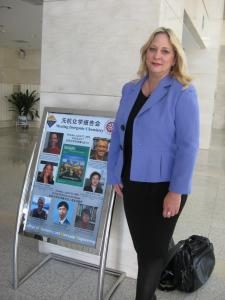 Kim Renee Dunbar has received many awards for her work in science and chemistry. The professor received her Ph.D. in inorganic chemistry from Purdue University and is a University Distinguished Professor and is the Davidson Professor of Science in the chemistry department at Texas A&M University. Here are five of the notable awards Kim Renee Dunbar has received.
Kim Renee Dunbar has received many awards for her work in science and chemistry. The professor received her Ph.D. in inorganic chemistry from Purdue University and is a University Distinguished Professor and is the Davidson Professor of Science in the chemistry department at Texas A&M University. Here are five of the notable awards Kim Renee Dunbar has received.
-
2018 Royal Society of Chemistry Fellow
Kim Renee Dunbar was named a 2018 Royal Society of Chemistry Fellow to recognize her global contributions to chemistry. Her research in synthetic and structural inorganic chemistry focuses on the application or coordination chemistry principles to the solution of problems, ranging from new conducting materials to anticancer agents. The Royal Society of Chemistry is the world’s leading chemistry community with more than 54,000 members and a 175-year history. “It was a huge honor to be recognized by the Royal Society of Chemistry, which I have been a member of for many years,” said Kim Renee Dunbar.
-
Basola Medal for Outstanding Research in Inorganic Chemistry
Kim Renee Dunbar was chosen as the recipient of the prestigious 2019 Basola Medal for
Outstanding Research in Inorganic Chemistry to celebrate her career achievements over the last three decades. The award is presented each year by Northwestern University and co-sponsored by the American Chemical Society Chicago Section.
“I am deeply honored to receive this medal,” said Kim Renee Dunbar. She knew Fred Basolo,
who the award is named for. “He and I had many long talks, and he regaled me with stories
about the history of coordination chemistry,” Kim Renee Dunbar said. “He was a wonderful role model and an inspiration to me.”
-
President’s Award from the National Organization for the Professional Advancement of Black Chemists and Chemical Engineers
In 2015, Kim Renee Dunbar was awarded the President’s Award from the National Organization for the Professional Advancement of Black Chemists and Chemical Engineers, one of six people to receive the award that year. It was given for her leadership and advocacy for underrepresented communities in STEM fields.
-
American Chemical Society Award Winner
In 2015, Kim Renee Dunbar was an American Chemical Society award winner. She received the ACS Award for Distinguished Service in the Advancement of Inorganic Chemistry. Kim Renee Dunbar was praised for her “outstanding achievements in the field of coordination compounds as magnetic and conducting materials and for extraordinary service in inorganic chemistry.”
-
Texas A&M Women Former Students’ Network Eminent Scholar Award
Kim Renee Dunbar was selected as the first recipient of the Texas A&M Women Former Students’ Network Eminent Scholar Award in 2012. This award was created to highlight the contributions of the university’s women faculty who demonstrate exceptional achievement in research, scholarship, artistic and creative pursuits, and engagement.

